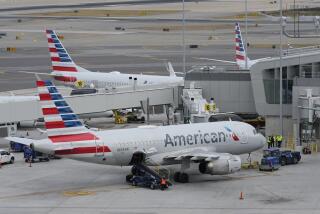Airlines testing demand with latest fare hike
The latest fare hike, initiated last week by Southwest Airlines, signals the airline industry’s efforts to test how much air passengers are willing to pay to fly, according to an industry expert.
The raise of $10 per round trip for flights shorter than 500 miles marks the fifth fare hike of the year that has been matched by all the major carriers.
But Rick Seaney, founder of the travel website Farecompare.com, said the hike represents a new tactic by airlines that are trying to generate more revenue without drawing the ire of passengers.
He noted that the $10 hike adopted last week by Southwest Airlines will primarily be paid for by business travelers on short-haul trips, including those flying between Southern California and the Bay Area.
“I think they are testing demand and they will continue to do it for the rest of the year,” Seaney said.
With the summer travel season coming to an end this month, airlines probably couldn’t get away with raising fares for leisure travelers, he said.
In fact, most airlines have in the last few weeks eliminated their peak travel surcharges, which raised fares over the summer by 10% to 20%.
Airlines also can’t blame higher fares on increasing fuel costs. The price of a barrel of oil dropped by about $10 since last spring, to $96 last week.
Last year, the nation’s largest airlines put forward 22 fare hikes, with 12 of those hikes being matched by most carriers.
Seaney said he doesn’t expect the industry to attempt as many hikes this year. “For now, they will just be probing,” he said.
Also:
United Airlines launches second fare hike in less than a month
Airfares grow by 4.8% in first three months of 2012, report shows
Extra fees can raise airfares by more than 50%, study finds
More to Read
Inside the business of entertainment
The Wide Shot brings you news, analysis and insights on everything from streaming wars to production — and what it all means for the future.
You may occasionally receive promotional content from the Los Angeles Times.











